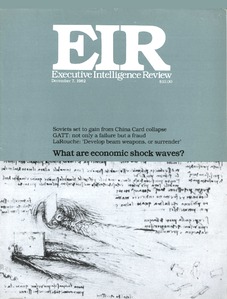Departments
Dateline Mexico
by Josefina Menéndez
Immigration bandwagon slows down.
Africa Report
by Douglas DeGroot and Mary Brannan
George Bush: “U.S. policy same as IMF’s.”
Report from New Delhi
by Paul Zykofsky
Relations with Japan improve.
Inside Canada
by Pierre Beaudry
The Queen’s men.
Science & Technology
by Marsha Freeman
A case of U.S.-Soviet scientific cooperation.
Editorial
Mopping up the “Mafia.”
Economics
Argentina Wields Its $5 Billion Debt Bomb
by Christian Curtis
Conversion of part of its obligations into bonds reflects the reality that the wherewithal for Ibero-America’s creditors doesn’t exist.
GATT Is Not Only a Failure at Expanding Trade, But a Fraud
by David Goldman
A survey of the actual state of world deficits, and their relation to the debt burden.
Documentation: Excerpts from the U.S. proposals for GATT
Currency Rates
U.K. Financial Warfare Against the Iraqis
by Judith Wyer
London is aiding Khomeini once more.
State and City Deficits Running Out of Control
by Stephen Parsons
The U.S. picture.
The Western Land Grab: Mont Pelerin Joins the U.S. Environmentalists
by Renée Sigerson
Promoting the sale of public lands-to the “black nobility” of Europe.
Foreign Exchange
by David Goldman
Flows into the dollar end.
Trade Review
by Mark Sonnenblick
Business Briefs
Special Report
What Is an Economic Shock Wave?
by Lyndon H. LaRouche, Jr.
The designer of the LaRouche-Riemann econometric model, Lyndon H. LaRouche, Jr., explains the model’s capacity to grasp economic processes in a non-subjective way within the physical universe, subject to the laws of the latter’s development-and therefore to grasp the “shock wave” phenomena so crucial in economic phase-changes. The model draws on the heritage of the great German mathematical physicists, who in turn built on the conceptions of Plato, the early Christians, and the Renaissance.
International
Soviets Set To Gain From Elimination of China Card
by Peter Ennis
Peking (including its new foreign and defense ministers) recognize the decline of the U.S. as a superpower and are cautiously looking to a “zone of peace” in Asia.
Japan’s Nakasone: How Long Will He Last?
by Richard Katz
Tokyo insiders’ assessment of the Liberal Democratic Party after the election of the new party leader and Prime Minister.
Fanfani Would Mean Bad News for Italy
by Nora Hamerman
Fat Henry Seems To Be On the Way Out
by Mark Burdman
Israel’s Labour Party Missing Its Chance for Counterattack
by Mark Burdman
In the wake of the New York Times scandal.
Argentina’s Nuclear Plan: History And Perspectives
by Lic. Luís Fernando Caliño
Part II of the report by the Acting Director of Energeia magazine in Buenos Aires.
Political Amnesty Key to Economic Development
by Valerie Rush
Colombian President Betancur is trying to wean the military from its sponsorship of terrorism.
Sri Lanka Falls Prey to the IMF’s Policies
by Ramtanu Maitra
International Intelligence
National
LaRouche: ‘Develop Beam Weapons, or Surrender’
by Steven Bardwell and Donald Baier
EIR’s founder addressed a conference in Bonn last month on the urgency of high-energy beam weapons that can destroy thermonuclear attack missiles.
FEF Proposes Two-Stage Missile Defense
by Marsha Freeman
Fusion Energy Foundation spokesmen explained Nov. 18 to a Washington, D.C. audience how the beam weapons work.
Army and Air Force Taken Over by the New Generation of ‘Whiz Kids’?
by Lonnie Wolfe
Two new documents display all the dangerous silliness of a systems-analysis approach to military questions, and the population-reduction outlook of their authors.
Documentation: Excerpts from Airforce 2000 and Airland Battle 2000.
Morgenthau, New York Times Challenged in Their New Effort To ‘Get LaRouche’
by Vin Berg
The Manhattan District Attorney’s witchhunt could involve more than he bargained for.
National News



